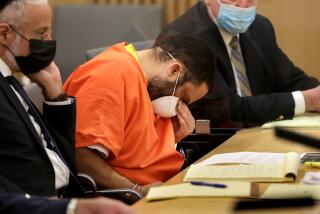Murder Verdict in Baby’s Death Overturned by Appeals Court : Law: Decision cites judge’s informal comments to jury and sets stage for a retrial unless ruling is challenged.
SANTA ANA — In a decision released Monday, an appeals court reversed the murder conviction of a man accused of beating to death his girlfriend’s 11-month-old daughter.
The 4th District Court of Appeal voted 2-1 to overturn the June, 1990, murder conviction of Steven Delgado. An Orange County Superior Court jury found the 24-year-old Santa Ana man guilty of second-degree murder in the death of Amanda Ortiz.
Prosecutors charged that Delgado, an insurance salesman, beat the baby with his fists while her mother, Elizabeth Ruiz, was at the store. After giving conflicting testimony, the baby’s 5-year-old brother told police that Delgado had hit the baby in the chest and head and hit him in the mouth.
During the trial, defense attorneys cited the 5-year-old’s earlier statements in arguing that two intruders committed the crime. They also raised the possibility that Ruiz’s estranged husband was alone with both children while she was out.
The appeals court cited two grounds for overturning the conviction.
The first reason cited was that Superior Court Judge Ragnar R. Engebretsen, who presided at the trial, spoke informally to jurors while they were deliberating. With no attorneys present, Engebretsen answered a hypothetical question from a juror about the admissibility of evidence of a previous criminal record of a defendant. That question was later followed by a written query, specifically about Delgado’s past.
The written question, wrote Associate Justice Thomas F. Crosby Jr. for himself and Associate Justice Edward J. Wallin, suggested that Engebretsen’s comments “probably fueled speculation that (Delgado) had a prior history of violence.”
Such a communication, Crosby wrote, “should have set off fire alarms with the court,” but the trial judge rejected a defense motion for a mistrial.
After the jury returned a guilty verdict, but before the sentence of 15 years to life was pronounced, the defense presented statements by Elizabeth Ruiz and other witnesses that she had injured the baby accidentally while trying to revive her, or that she had intentionally beaten her.
However, after considering the matter for several months, Engebretsen denied a defense motion for a new trial, noting that Ruiz had made numerous conflicting statements about the killing to authorities and on the witness stand. The judge said he believed the jury had considered the possibility of other suspects, including Ruiz, in their deliberations.
The appeals court sided with the defense on that matter as well, writing that “the judge did seemingly substitute his judgment for that of the jury. But a confession to murdering one’s own child is not to be taken lightly, even from an obviously biased witness.”
Observing that there “was sufficient evidence to support the convictions,” the appeals court wrote that Delgado could be retried.
Associate Justice Henry T. Moore dissented, saying that the judge’s conversation with the jurors was a “harmless error” and that Engebretsen was correct in evaluating Ruiz’s confession.
Deputy Dist. Atty. Robert C. Gannon Jr., who prosecuted the case, said that the district attorney’s office was deciding whether to appeal the court’s ruling or retry Delgado.
Defense attorney Frederick L. McBride could not be reached for comment.
In other action, the appellate court unanimously upheld two separate murder convictions growing out of street killings but struck down sentence enhancements on both.
The court reduced the first-degree murder and robbery sentence of Rey Adam Esquerra from 35 years to life, to 30 years to life, for a racially motivated killing that grew out of a spilled bottle of beer on a Santa Ana street.
The court ruled that in the June, 1989, shooting of Eugene Robinson, a 34-year-old African-American, Esquerra’s subsequent theft of Robinson’s gold neck chains was “incidental to the killing and the evidence demonstrates the true motive behind the attack was racial.”
The court also found that a judge had erred in adding prior convictions to the second-degree murder sentence of Pedro Sanchez, convicted for the November, 1989, shooting of Luis Jose Flores, 21, on a Fullerton street, a place, the court wrote, where “looks can literally kill.” The shooting grew out of some angry stares, which escalated to an exchange of insults.
More to Read
Sign up for Essential California
The most important California stories and recommendations in your inbox every morning.
You may occasionally receive promotional content from the Los Angeles Times.










